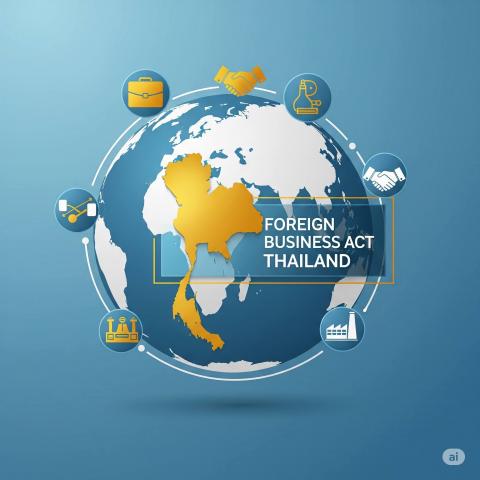Foreign companies looking to explore the business landscape in Thailand without immediately engaging in revenue-generating activities often find establishing a Representative Office an ideal first step. PS Law & Business offers expert legal guidance to navigate the setup process smoothly and ensure full compliance with Thai regulations.
Understanding a Representative Office in Thailand
A Representative Office (RO) in Thailand is an entity established by a foreign head office to engage in limited, non-commercial activities. It acts as a local point of contact and information gathering center for its parent company. Crucially, a Representative Office is not permitted to earn income, make sales, accept purchase orders, or enter into business negotiations on behalf of its head office in Thailand.
The primary purpose of an RO is to serve its head office by performing specific "service" functions. All operational expenses of the Representative Office must be covered by funds remitted from its foreign head office.
Permitted Activities for a Representative Office
Under Thai law, a Representative Office is generally restricted to one or more of the following five activities:
- Sourcing Goods or Services: Finding local suppliers of goods or services in Thailand for its head office.
- Quality and Quantity Control: Inspecting and controlling the quality and quantity of goods purchased or ordered by its head office for manufacturing in Thailand.
- Advisory Services: Providing advice concerning the head office's products sold to agents, distributors, or consumers in Thailand.
- Information Dissemination: Providing information to interested parties in Thailand concerning new products or services of its head office.
- Reporting: Reporting to its head office on local business developments and activities in Thailand.
Engaging in activities beyond these stipulated scopes can lead to legal and tax complications.
Key Requirements and Considerations
- No Revenue Generation: The RO cannot generate income within Thailand.
- Financial Dependence: All expenses must be financed by the head office.
- Capital Remittance: There are minimum capital requirements that must be remitted into Thailand over a specified period. Typically, a total of at least THB 2 million is required, with specific tranches to be brought in over the first few years of operation. This capital is for covering operational expenses.
- Registration: While a Foreign Business License (FBL) under the Foreign Business Act is not always required as it once was for all ROs, registration with the Department of Business Development (DBD), Ministry of Commerce, is necessary. Specific conditions will determine the exact licensing or notification requirements.
- Manager: At least one person must be appointed as the manager responsible for the operations of the Representative Office.
- Reporting Obligations: Annual reports on activities and financial statements (even if no income) must be submitted to relevant Thai authorities like the DBD and the Revenue Department.
- Taxation: Generally, a Representative Office is not subject to corporate income tax in Thailand as it does not earn income. However, it must still obtain a tax ID number. Employees of the RO are subject to personal income tax in Thailand.
- Work Permits: Foreign nationals working for the Representative Office require work permits. The RO structure can offer a more favorable ratio of Thai to foreign employees for work permit purposes compared to other business structures.
Benefits of Establishing a Representative Office
- Market Research & Presence: Allows foreign companies to study the Thai market, build relationships, and establish a physical presence before committing to larger investments.
- 100% Foreign Ownership: The Representative Office is an extension of the foreign parent company.
- No Corporate Income Tax: As it is non-revenue generating, it is generally exempt from corporate income tax.
- Simpler Work Permit Ratios: Often provides more favorable conditions for obtaining work permits for foreign staff compared to a standard Thai limited company.
- Limited Activities, Limited Liability: The defined scope of activities limits operational complexity and potential liabilities for the head office related to Thai-based commercial transactions.
How PS Law & Business Can Assist
Navigating the legal and administrative procedures for establishing a Representative Office in Thailand can be complex for foreign entities. PS Law & Business provides comprehensive support, including:
- Advising on the suitability of a Representative Office for your business objectives.
- Preparing and submitting all necessary applications and documentation to the Department of Business Development and other relevant authorities.
- Assisting with the opening of a Thai bank account for capital remittance.
- Guidance on work permit and visa applications for foreign personnel.
- Ensuring ongoing compliance with Thai regulations, including reporting requirements.
- Advising on office lease agreements and other operational setup needs.
Our experienced lawyers understand the nuances of Thai law and are dedicated to helping foreign businesses establish their presence in Thailand efficiently and effectively.
Frequently Asked Questions (FAQ)
Q1: Can a Representative Office in Thailand make sales or sign contracts?
A: No, a Representative Office is strictly prohibited from engaging in any revenue-generating activities, including making sales, signing commercial contracts, or issuing invoices in Thailand.
Q2: What is the minimum capital required for a Representative Office?
A: Generally, a minimum capital of THB 2 million is required, which must be remitted into Thailand in installments over a few years to cover operational expenses.
Q3: Does a Representative Office need to pay corporate income tax in Thailand?
A: Since a Representative Office does not generate income in Thailand, it is generally not subject to corporate income tax. However, it must still comply with certain tax filing obligations.
Q4: How many foreign employees can a Representative Office hire?
A: The number of work permits for foreign employees depends on factors such as the nature of the permitted activities and the amount of capital remitted. The ratio of Thai to foreign employees is generally more favorable than for other business structures. PS Law & Business can advise on specific cases.
Q5: What happens if a Representative Office conducts activities outside its permitted scope?
A: This can lead to serious legal consequences, including being deemed as operating an unlicensed business, potential tax liabilities on worldwide income, and revocation of the Representative Office status.
Q6: How long does it take to set up a Representative Office in Thailand?
A: The timeframe can vary depending on the completeness of documentation and processing times at government offices. Generally, it can take a few weeks to a couple of months once all required documents are prepared and submitted. PS Law & Business will guide you through each step to ensure efficiency.




